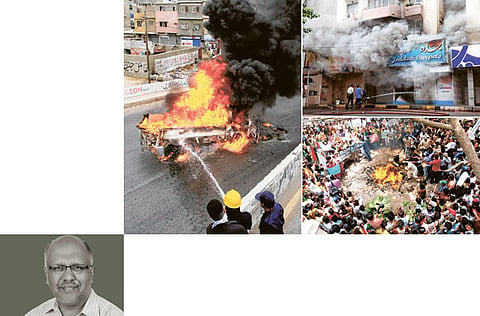Pakistan reforms nowhere in sight
Civilian rulers have failed to steer the country towards a sustainable democratic future

Continuing violence across Pakistan's southern port city of Karachi in the recent past has once again come as a powerful reminder of the mounting challenges which confront the south Asian country's political and economic future.
While the dust settled after days of killings in Karachi that rocked prospects for the future of Pakistan's main cosmopolitan city, the recent events also said much about the overall future of the Muslim country which also proudly presents itself as being armed with nuclear weapons.
Yet, Pakistan's political and economic evolution, for the moment fails to show the country as heading towards greater stability. Almost 64 years after its creation as an independent state, and more than three years after the last military ruler stepped down from power, Pakistan's political and ruling class fails to miss any opportunity for bickering and squabbling.
A recent example helps to illustrate the slide. A provincial minister from Sindh, of which Karachi is the local capital, chose to publicly denounce those who live in the province, speak Urdu and belong to families that migrated from India in 1947.
Widespread violence ranging from killings to the burning of cars quickly ensued, forcing the provincial minister who is also a close ally of President Asif Ali Zardari, to publicly seek an apology for his comments. While the dust seemed to settle thereafter, there is no assurance that a similar episode will not erupt yet again.
Fundamentally, Pakistan is surrounded by a crisis of government and governance. On the one hand, the country's so called democratic rulers have failed to steer it towards stability since they were handed down power following the 2008 departure of former president General Pervez Musharraf.
In the three years or so which have followed Musharraf's rule, Pakistan's cause for democracy has hardly been helped by the trends prevailing across the country. During this time, political institutions have weakened and further lost track of progress as the ruling class failed to make them oriented increasingly towards tackling some of the most difficult challenges faced by Pakistan.
At the same time, Pakistan has only floundered further in seeking prospects for stabilising the country's economy. In the past week, as Karachi remained the centre of Pakistan's public attention, incoming reports of the resignation of the country's central bank governor became a bit of a sideshow. Yet, realistically, the reports that Shahid Kardar, the governor, has stepped down just nine months into his job, deserve far greater attention for anyone looking at the future of Pakistan.
Responsible spender
Kardar, a chartered accountant by training, is one of Pakistan's most eminent, credible and respected economists with a long history of sticking to his principles. Though his resignation is not yet confirmed, the accounts making the rounds so far, largely appear to suggest that his break with the ruling structure came on the matter of his failure to convince the government to become a more responsible spender.
For the moment, individuals like Kardar may fail to discourage profligate spending, especially amid reports that national elections which are due by 2013 may in fact be held next year. Yet, it is equally true that a failure to appreciate individuals like Kardar may only be at the cost of Pakistan's best interests.
Going forward, the need to stabilise Pakistan's political and economic future may require the country's ruling class to put in place a broad set of progressive reforms.
This is all the more vital at a time when the ongoing security challenges faced by Pakistan driven by the conflict between its security services and groups of determined militants, show no sign of going away any time soon.
But if recent events are indicative of what to expect, Pakistan's rulers appear to have little ability to change course for the better. The trends of the past three years since Pakistan embarked on the road to democracy once again, speak volumes for the country's emerging outlook. Eventually, lessons must also be learnt from Pakistan's history as a country which has hovered between short-lived periods of democracy and military rule. Today, the Pakistan army is back in its barracks and shows complete determination to abide by its commitment to civilian rule.
Yet, the army's commitment on its own is no guarantee of the continuation of a civilian democracy of the kind that many Pakistanis would ideally seek. The completion of Pakistan's journey towards a sustainable democratic framework must be built upon a strong legacy of political and economic reforms that are nowhere in sight and still waiting to come together.
Farhan Bokhari is a Pakistan-based commentator who writes on political and economic matters.


